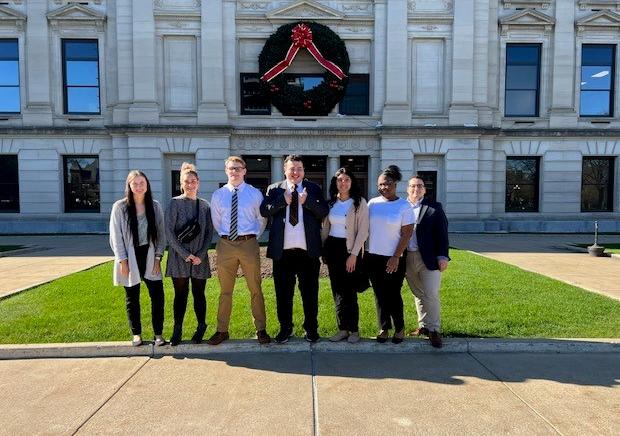
PFW Story
Law, ethics, and professionalism class visits Allen County Restoration Court
Ask any college student and they’ll probably tell you learning experiences absorbed outside of the classroom are as good, if not better, than those that happen in the same general setting week in and week out.
With this in mind, Alice Jordan-Miles, director of Purdue University Fort Wayne’s Behavioral Health and Family Studies Institute, took her law, ethics, and professionalism class to the Allen County Circuit Court’s Restoration Court on Wednesday. She knew it would be an eye-opening experience.
“I can’t teach them what they learned, which is empathy and critical thinking to the level displayed there,” Jordan-Miles said. “This gives them a better understanding of societal issues in person, live in front of them. I love exposing my students to things like this.”
Restoration Court is a certified mental health problem-solving court for felony offenders assessed with co-occurring mental illness and addiction diagnoses, usually with drug- or alcohol-related offenses. The goal is to encourage offenders to rehabilitate themselves by being willing to take steps to address the underlying causes.
Eleven of Jordan-Miles' students, mostly Department of Human Services majors, met with Judge Ashley N. Hand in her chambers before attending court where they witnessed Magistrate Jesus R. Trevino meet with 30 defendants.
“I saw how the inspiration behind the Restoration Court works and how it helps the community,” said junior William Meyer. “I was not expecting it to be so happy, calm, peaceful, and helpful for some of the people I saw. I was expecting it to be a little more negative and have lower energy than I saw.”
Instead, the conversations between the judge and defendants were more conversational, with Trevino asking how they were doing when they approached the microphone. Several students said he appeared genuinely interested in the people before him.
“He was treating them with respect,” said junior Ernesto Rodriguez. “You don’t see that in other courts because it’s more straight to the point. Here, they were trying to find solutions and showing that they really want to help the people.”
This was the fifth time Jordan-Miles had taken a class to Restoration Court.
“Individuals who went in and admitted their bad choices or their faults, of course, you got a sanction, but the judge appreciated their honesty,” Jordan-Miles said. “Being honest is part of their journey.”
Not every defendant the PFW students observed had learned that lesson. One said he tested positive for fentanyl because he was giving his mother her diabetes medicine. Another said he accidentally swallowed his mouthwash. Others blamed cough syrup and supplements. One man admitted he drank four gallons of water each time before testing, which is why he had 11 diluted results.
“I was impressed by the way the judge handled all the BS some of the people were giving him,” said junior Shane Delaney. “He was very understanding and really wanted to help them.”
Whenever someone tried to beat the system, that’s when they were arrested, Jordan-Miles said. Of the 30 defendants that day, four were arrested immediately.
“One thing that was talked about in chambers beforehand was how there was a lot of mental illness, and that mental struggles are a key emphasis,” Meyer said. “It was still shocking to see how gracious they were, how kind and how it lowered the anxiety for the defendants, and the general humanity and respect the judge gave them.”
Other students were surprised by the amount of activity in the courtroom, with people talking, or coming in or leaving after the proceedings had started. One woman brought her toddler and baby with her.
Jordan-Miles said her next goal is to take students to the Indiana Statehouse in Indianapolis to see where and how laws are created.




